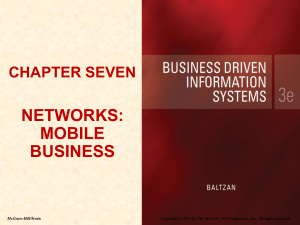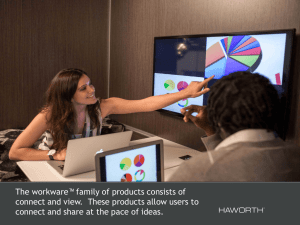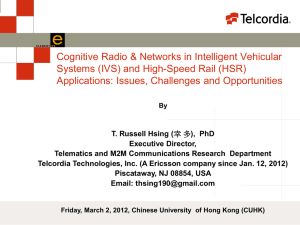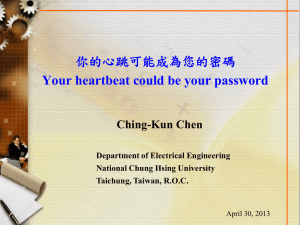Document
advertisement
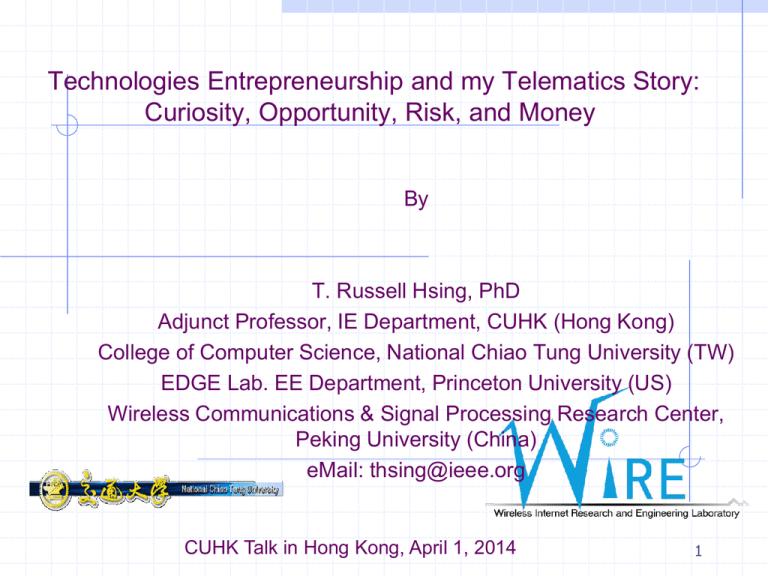
Technologies Entrepreneurship and my Telematics Story: Curiosity, Opportunity, Risk, and Money By T. Russell Hsing, PhD Adjunct Professor, IE Department, CUHK (Hong Kong) College of Computer Science, National Chiao Tung University (TW) EDGE Lab. EE Department, Princeton University (US) Wireless Communications & Signal Processing Research Center, Peking University (China) eMail: thsing@ieee.org CUHK Talk in Hong Kong, April 1, 2014 1 Vehicular Networks & Telematics App. Safety/Auto Services Navigation & Mobility Infotainment & E-commerce V2I Communication V2V Communication GPS Telematics Enabled Vehicles Connected Vehicle Services Enabling Trends •Safety/Auto services •Smartphone Platforms •Driver Safety and Security •Vehicle Maintenance •App Store Business Model •Tethering for OBU • Navigation & Mobility •OBU and Passenger Entertainment Systems •Traffic, ETA, POI, Localized Searches •Tolls and Parking •Embedded wireless and sensors •Smartphone integration with improved HMI •Infotainment & E-Commerce •Infrastructure •Digital Content •Social Networking •Vehicle Infrastructure Integration (Future) •Cloud based delivery 2 To R. Hsing – 2 .NET: End-to-end secure communications in vehicular networks Private servers Road side equipment V2V secure communications Security – – – – – V2I secure communications Internet Public servers In-network secure communications requirements in vehicular networks Authentication and data security Privacy (Identity, location, type of service) Secure broadcasts Scalability & real-time response Availability & malicious behaviour detection To R. Hsing – 3 The role of ICT technologies in High-Speed Rail (HSR) Train – Control System Data transmission Required high reliability and security Communication – Voice communication – Diagnostics, CCTV or etc. Passenger service (Amtrak, USA) TGV (SCNF, France) Train crews and operation center Data transmission – System Acela Express Tokaido Shinkansen (JRC, Japan) Wi-Fi connecting to Internet To R. Hsing – 4 End-to-End Automotive Telematics Solution Ecosystem Mobile Wireless Access Telematics Enabled Vehicles Vehicle Diagnostics Application Wireless Network (Cellular, WiFi, satellite) IInternet Network Roadside Assistance Services Platform, Applications, Operations Support, Billing Communication design and software: KT partnering with OBE supplier OEM and Suppliers of on-board devices Service Center Web-based Customer Access Wireless carrier: CHT, FET, TMC,Verizon, at&t Supplier: Operator: OEM, or a service provider Other Applications and Services OEM Dealer 3rd party service providers: Various providers of call center, roadside assistance, … 3rd party application providers: Various suppliers including Telcordia Solution Provider and System Integrator To R. Hsing – 5 Questions: 1.*Does Internet Network have an Achilles’ Heel? 2. Can we “guarantee” QoS for Internet-based Network? 3. Can we use the current wireless 3G/4G to provide secured and effective Vehicle-to-Vehicle (V2V) communications? Small cell networks? 4. Wireless 5G: Why, How, and What ? Source: “Networks: Friend, Money, and Byte” (by Prof. Mung Chiang, Cambridge Press) PA vs Abilene TOPOLOGY: PRINCIPLES, MODELS, AND VALIDATION Fig. 3. 121 Five networks having the same node degree distribution: identical from a degree-based perspectiv To R. Hsing – 7 Wireless Evolution: Technologies, Services and Business Models Internet of Things Internet of Vehicles 5G Packet Networking 3G/4G Internet Smart Grid Internet Manufacturer Digitalization 2G/2.5G Internet Manufacturer 1G Internet Manufacturer September 28, 2013 8 Wireless 5G: How? (i.e. Anticipated Features) • In the Near Future: Wireless 5G’s anticipated features Wireless 5G technologies should deliver explosive range & depth services: Personalization, Immediacy, Anticipation, Smart Data Pricing (SDP) NFV/SDN-Based Mobility Management for Wireless 5G Cognitive Radio Network (CRN)-Based Spectrum Sharing New Business Models: NaaS, DaaS, KaaS September 28, 2013 9 Wireless 5G: What? (i.e. Enabling Services Creation) (2/2) -Applications- & Services- Driven Research for Services Creation Based on Cloud & Fog Computing Platform to develop Mobile Applications which are ubiquitous, scalable, reliable and cost effective Internet of Vehicles (IoV) and Healthcare Services Privacy-preserving secured communications Green Communications for Future Mobile Wireless Technology and Services Provision Big Data (Data Mining & Management, Security) Applications ISP, Content provider, Consumer Win-Win-Win ecosystem New Business Models: NaaS, DaaS, KaaS September 28, 2013 10 Golden Opportunities Now Demand >> Supply -All of local high-tech companies need to be transformed From current OEM/ODM (low-profit margin) Business To Innovation/IPRs- based (high-profit margin) Business -They will be looking for solutions from technology-based Start-ups to fill their gap September 23, 2013 11 Technology Entrepreneurship: Process Flow Proof of Concept Demo Curiosity Entrepreneur’s DREAM Gut, Data, Gut Product or Service Market Size Opportunity Recognition Pursuit of Opportunity People and Organization Resources and Capital Execution April, 2014 14 1. The Entrepreneur and the Challenge An entrepreneur is a person who undertakes the creation of an enterprise or business that has the chance of profit The entrepreneur is a bold and Imaginative deviator from established business methods and practices who constantly looks for the right opportunity to commercialize products, technologies, processes, and arrangement Entrepreneurs can create successful firms that exhibit performance, leadership, reputation, and longevity Entrepreneurs seek to achieve a certain goal by starting an firm that will address customers’ needs and the market 2.What Does an Opportunity Mean to Entrepreneurs? An opportunity is a favorable juncture of circumstances with a good chance for success. It is the job of the entrepreneur to locate new ideas and put them into actions Entrepreneurs respond to opportunities by exploiting changes, needs, or new skills or knowledge within the content of their industry Entrepreneurship can be defined as the identification and exploitation of previously unexploited opportunities Generally speaking, only about 1/3 or fewer new ventures survive their first three years. To avoid the realm of daydream and fantasy, one needs to start the practice of experimenting, testing, and learning about his (her) entrepreneurial self. 3. How to Evaluate Potential Opportunities? The successful entrepreneurs will always look for a timely, solvable, important problems with a favorable context that can lead to “profitability” Five characteristics of an attractive opportunity – Timely- a current need or problem – Solvable- a problem that can be solved with accessible in the near future - Important- the customer deems the problem or need important - Profitable- the customer will pay for the solution and allow the enterprise to make profit - Context- a favorable regulatory and industry situation 4. Entrepreneurial Capital and the Value of a Venture Expected Market Value (MV) for an enterprise (After a period of time) = Management (M) x Context (C) x EV = Manag.x Cont. x Opport. x Ecompet. x Ecommitment Example: Google Story – Founded by two 26-year-olds graduate students (at CS Department, Stanford University) , Larry Page and Sergey Brin, who developed a search engine – This is an excellent example of a powerful combination of entrepreneurial capital , competence and commitment with an efficient management and leadership. – Google was established on September 7, 1998, and IPO successfully on August 19, 2004 (raising US$1.67B, with a Market Cap of US$23B) – As of August 4, 2013, the Market Cap was: US$289.97B 5. Building an Enterprise Example 1: Sun Microsystems was founded in 1982 by a team of four young men (Vinod Khosla, Andy Bechtolsheim, Scott McNealy and Bill Joy, all are age of 20s), – Vinod K.: Marketing, Design, and the Leadership Skills – Andy B.: Strong skills in designing and hardware workstation – Scott Mc.: Manufacturing and management skills – Bill J. : Leading Software Designer The Sun Microsystems has revolutionized the computer industry since then. Example 2: Broadcom’s story…… Example 3.: “Social Networks” Movie 6. The Firm (organizations, enterprises, and corporations) • The purpose of a firm is to establish an objective and missions and carry it out for the benefits of the customers • A firm acts to develop, attract, and retain intellectual capital • A firm uses intellectual capital to design and build products and/or services • A firm provides a place where people can collaborate, learn, and grow • A firm’s theory of business depicts how it understands its total resources, activities, and relationships. 8. Entrepreneur Test (from “Technology Venture”, p.7) 1. When I am faced with a challenge, I am confident that I can work through it. 2. I want to be financially independent and be rewarded for my accomplishments 3. Trying something new is attractive, even if I know the risk of failure is significant 4. I would prefer to gain independence and control my destiny 5. Building a new enterprise is important to me 9. Entrepreneur Test (from “Technology Venture”, p.7) 6. My experience during my youth and early career have shown me the benefits of starting a new enterprise. 7. Starting a new business some day soon is always in my thoughts. 8. I like working with others and can provide leadership when called upon 9. Our society and my family provide a strong, supportive base for my initiative 10. I posses strong technical and relationship skills in the industry I wish to enter Gracias ! Dziekuje ! 謝謝 ! Thank You ! To R. Hsing – 23



